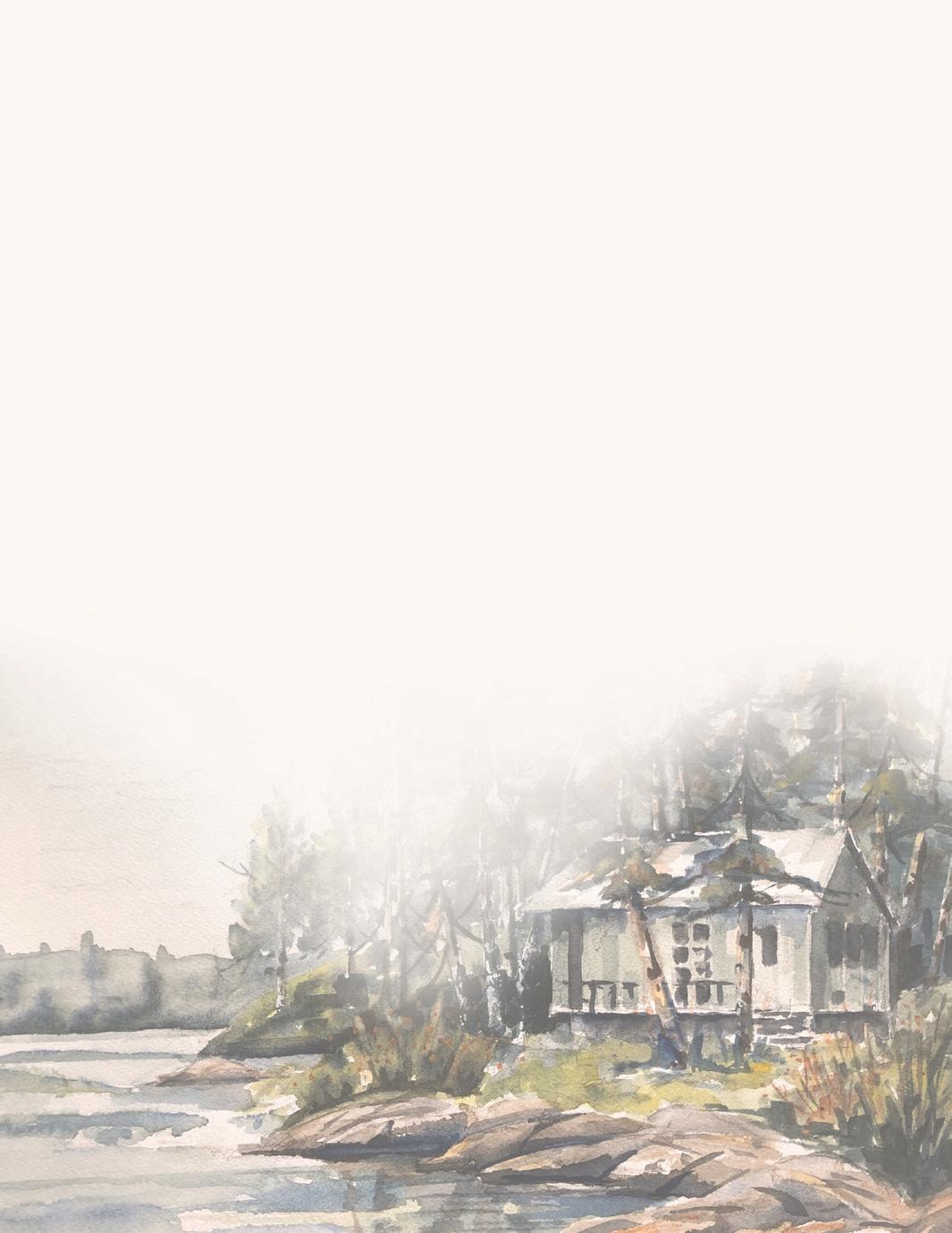
8 minute read
Memories of Clearwater Bay
Introduction by Tannis Erwin Engel–Memories by Phyllis Ketcheson
Following are memories shared by my Aunty Pook—Her name is Phyllis, but she was always Pook to us. She grew up in Winnipeg and the cottage has been in the family since she was a little girl and, of course, for my whole life. She inherited the cottage from my grandparents in the 1990s, and we subsequently purchased it from her and her husband, Donald Ketcheson (Ketch to his friends and family), in 2014.
Advertisement
It was a succession that happened partly because my dad, her only brother Stewart, passed away when I was only 15 years old. It was the cottage that was the glue that held our small family together. Pook and Ketch were both so creative and inspiring, Ketch an interior designer and Pook a visual artist. They led a glamorous and busy life in Toronto but always had the cottage to come back to every summer to stay grounded and gather with our Winnipeg family. Now in her 80s and without Ketch, who passed away in 2018, Pook finds the journey to Clearwater Bay more difficult but her love and lasting memories of lake life remain strong.
Pook got her creativity from my grandparents Ralph and Helen Erwin. My grandmother was a concert pianist and my grandfather was an actor that managed a traveling acting troupe called Chautauqua. Although they were Americans, his troupe travelled through Northwestern Ontario and the prairie provinces throughout the 1920s. This is how Ralph discovered the beauty of the Lake of the Woods area and eventually settled in Winnipeg, where he started up a successful restaurant chain called Salisbury House that is still in operation today. But that is a long story to be told another time.
The following memories of Clearwater Bay are in Pook’s words. They are stories I have grown up with and will also continue to share to ensure our family’s long and wonderful history at Clearwater Bay is always remembered.
POOK’S MEMORIES
While my parents Ralph and Helen Erwin bought the Clearwater Bay property in 1945, our family's time on the lake actually began in 1938 when my father rented a cabin at Granite Lake. Fishing was undoubtedly the main attraction, which brought the family back there for the next three years. I was four and my younger brother Stewart was two. Then in 1941, Ralph learned about a camp for sale on Clearwater Bay, off McCallum Point Road.
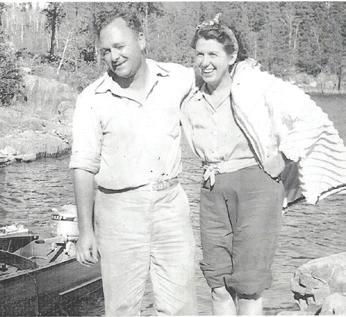
Helen and Ralph coming or going with the Peterborough boat in the background.
He and my mother went immediately to see the property. The location was special, 1.5 acres on a pieshaped piece of land, with a wide shoreline covering a bay on each side. There were only four other camps on the whole Clearwater Bay side of McCallum’s Point at the time.
The camp was simply furnished. There was a small kitchen and cook stove and an ice box, one window and a door leading onto a small porch, which was also the dining area. A small brick fireplace was at one end of the living room with a “Winnipeg” couch which opened out to make a double bed. There were partitions forming two bedrooms with two single cots in each, with a window in each room. None of the camps had running water so each one had outhouses instead.
While the asking price was $800, which was more than my parents could afford, it was irresistible. But somehow, they would manage. How fortunate for our family and the subsequent grandchildren and great grandchildren that they made the decision to take the risk.
At the end of the 1920s, my American parents had lived in New York City before moving to Winnipeg. My mother loved the excitement of the big city, so adjusting to camp life in the Canadian wilderness was a big step. It became their true home.
In 1941, there was no road access from McCallum Point Road to the camp. We used to park across the small bay where the road ended and row a boat to the camp. My mom, brother Stew and myself and sometimes my grandmother would spend the whole summer at camp. My dad took long weekends, Thursday night to Monday morning. He would honk the car horn upon arrival. Our mother would row over to pick up him and all the exciting goodies from the city. After dinner, we’d play board games—parcheesi, snakes and ladders, checkers, and cards. A unique lamp hung over the oilcloth-covered table. It had two fragile small oval-shaded bag light units that burned white gas. From time to time the lamp had to be pumped up with air to keep it burning. It hissed as it burned.
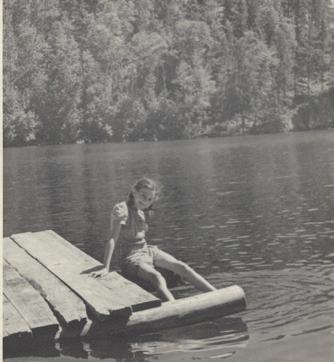
Pook poses on the old swim dock
The water, which was so clear (the reason for the Clearwater Bay name) was hauled up to the kitchen. It was drinkable for many years straight from the lake! How convenient it was to scoop a cupful of water out from the boat when fishing on a hot day. The family boat was a wooden Peterborough craft with a huge 16 horsepower motor. It had removable seat backs, where my brother used to sleep under the cowl on the way home from a day of fishing in Echo Bay or Cul de Sac. We never saw any bears, only a few deer on our trips. However, there was a young moose who appeared often on the small point of land on the opposite side of the bay. It was quite tame because we could paddle our rowboat fairly close to it.
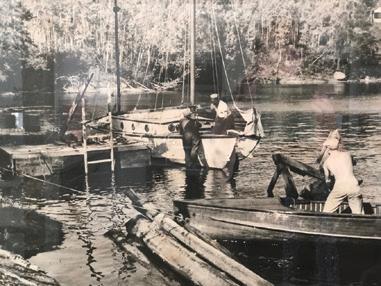
Ralph, Cecil Platford and another friend working at the dock in the early 40s.

Helen, Ralph, Pook and Stewart relax after a dip. The family often hosted guests from the city or other nearby cabins.
Driving from Winnipeg via the old road through Beausejour and West Hawk Lake during the war years meant we almost always had to stop for Dad to change a tire. Rubber was scarce, and tires were worn out. It was also always necessary to stop at what was then known as the Dog Farm, owned by Cecil Platford, to buy a chunk of ice. As a kid, I marvelled at the ice being available in the summer. Cecil would haul out a big chunk. My dad always carried a gunny sack in the car to carry the ice in. A chunk would last in the ice box for almost a week. We had an outdoor storage hole in the ground for butter and eggs, vegetables, etc. which were not as perishable. It was covered with a thick tarp and some heavy rocks.
Cecil, whose place eventually became known as the Rockeries, sold home grown vegetables from his garden. We ate well.
Our days were carefree. We got up when we felt like it, ate when we were hungry, and went to bed when it was dark. My brother and I used to spend hours on our beach building houses for the frogs or tree toads. We were always curious that they were gone in the morning, wondering how they had escaped.
In the first year, an L-shaped dock was built on a reef jutting out from the beach on either side, which the winter ice promptly took out the following spring. Subsequently, a boat dock was built in the small bay where it was protected. A tiny swimming dock was also built against the shore close to the camp. It wasn’t long before a road right to the camp was built and my father put in a running water system to the kitchen. A gas run pump was by the lake, placed on a flat rock about eight feet above the waterline. It was started by my dad pulling on a rope wound around a starter plate to get the engine going. A second person had to stand at the back of the camp to yell “STOP” when the geyser of water shot out of the tank. A pipe leading down to the kitchen had a tap over a basin.
In the evenings, the adults would socialize in the living room, while my brother and I were supposed to sleep on the other side of the partition. We climbed up the wooden partitions to peek over the top.
Like many families of the time, in the 1950s, the year of the devastating flood, my father sent the family to camp, much earlier, in May. A friend and her mother stayed with us as well. Our Winnipeg home was used by some of my father’s staff whose homes were likely flooded. Clearwater Bay in the spring was wonderful. What a great vacation far from the tragedies occurring in Manitoba and North Dakota. We had no school work to do either.
Eventually, a three-burner stove was installed, so there was no need to light a fire when you wanted to heat something up or cook quickly. A kerosene fridge was also installed, and so began years of kitchen improvements. A series of barbecues were built, first a small brick one on the beach, then a fairly large one at the east end of the yard. It was a proper oven-like affair, built of round stones with a chimney. Next, was a barbecue oven built on the other side of a newly constructed beautiful stone fireplace. The outdoor barbecue oven was connected to the same chimney. The final barbecue was also a smoke oven built outside during the 1954 kitchen, dining, and sitting room addition. It is still in use today.
Life was simple and carefree, nothing to break down as there was no electricity, no running water and no phone. I have often felt we should go back to that simple way of life without all the modern conveniences the camp has today.
Thanks to all those steps taken by my parents, our family camp at Clearwater Bay has become an integral part of all of our lives. My niece and nephew, Tannis and Gerry Engel, have turned it into a wonderful, winterized home they enjoy with the whole family, siblings, nieces, nephews, children and grandchildren year-round.
This is the fifth generation enjoying Clearwater Bay life. None of this would be possible without the stoic dedication and vision of Ralph and Helen when they first fell in love with this part of the world and made it home. an
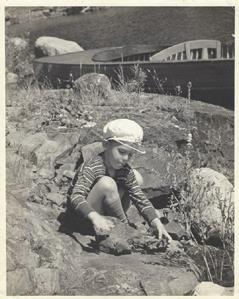
Pook’s younger brother Stewart enjoying some quiet time on the front point.

Cozy living room features the original fireplace. One of Aunty Pook’s paintings hangs on the wall.
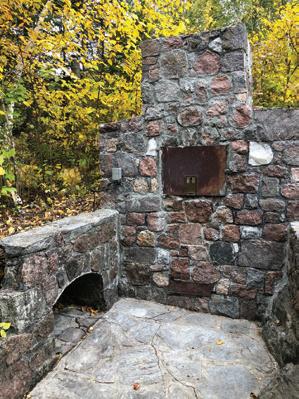
Final stone BBQ built by Ralph in 1954 is still in use today.
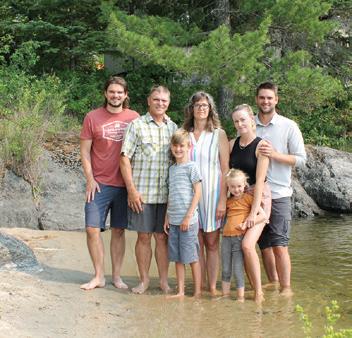
Three generations gather at the cottage: Gerry and Tannis (centre), their sons Tanner (far left) and Cord (far right), Cord’s wife Stacey and children Eli and Piper.

